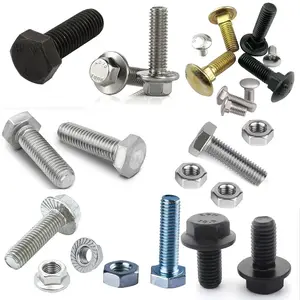



















Chúng tôi cung cấp screw and nut giá sỉ để lắp ráp và buộc chặt hiệu quả. Đối với các công ty kinh doanh máy móc hoặc công việc bảo trì, các sản phẩm như bu lông vai là cực kỳ hữu ích. Những bu lông này rất cần thiết để ghép các bộ phận chuyển động như ròng rọc và bánh răng lại với nhau. Phần hình trụ chưa được uốn ở giữa trục cho phép chúng hoạt động như các điểm xoay, cho phép quay các bộ phận gắn liền khác.
Bu lông móc treo có ren ở cả hai đầu và một đầu kép như vậy thiết kế làm cho các bu lông như vậy phù hợp để sử dụng trong các tòa nhà nội thất. Chúng thường được sử dụng để cố định các kết cấu gỗ và kim keyword với nhau vì những bu lông này thường phẳng ở một đầu và nhọn ở đầu kia, với phần được thiết kế với các sợi gần hơn có nghĩa là đi vào kim keyword. Chúng được sử dụng rộng rãi để cố định các bộ phận của đồ nội thất trên bàn và ghế.
Bu lông lục giác hoặc bu lông đầu lục giác, có đặc điểm là đầu lục giác sáu cạnh, rất linh hoạt và được sử dụng trong nhiều ứng dụng . Có cả thiết kế ren một phần và ren hoàn toàn. Bu lông có ren hoàn toàn phù hợp hơn cho việc sử dụng hạng nặng vì áp lực có thể được phân tán trong toàn bộ chiều dài của chính bu lông sau khi lắp đặt. Với độ bền cao hơn, chúng thường được sử dụng để sửa chữa và bảo trì các cấu trúc như cầu và tòa nhà.
Chúng tôi cũng có bu lông vận chuyển cho các ứng dụng trong đồ gỗ hoặc mộc. Chúng chỉ có thể được tháo chốt từ một phía, thêm một lớp an toàn khi cố định hoặc tháo rời các cấu trúc. Để đảm bảo đường ống trên cao và ngăn các đường ống di chuyển hoặc va vào nhau, một bu lông cong có ren ở cả hai đầu như bu lông chữ U có thể là một sản phẩm được lựa chọn. Những bu lông này cung cấp hỗ trợ cấu trúc tốt và rất tốt cho các giải pháp đường ống. Tìm thêm screw and nut tại Alibaba.com!